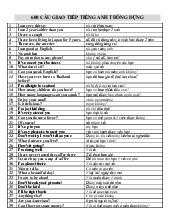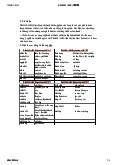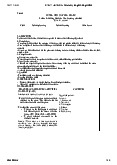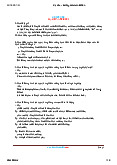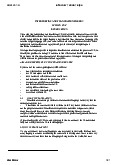

Preview text:
16:23 29/7/24
K47CLC - Reading TACN2 - Midterm PDF
Học viện Ngo i giao ạ thi gi Đề ữa h c k ọ II 2021-2022 (h ỳ c k ọ ỳ IV)
Khoa Tiếng Anh
Môn: Tiếng Anh Ngo i giao 2 ạ – K47CLC K
ỹ năng: Đọc hiểu
Thời gian: 60 phút
Read the following article and do the tasks that follow:
Bangkok’s illicit craft brewers risk arrest under draconian laws
By Rebecca Ratcliffe and Navaon Siradapuvadol Friday, 4 Mar 2022 1.
Talking to the Guardian under a pseudonym, Naamcial, a Thai craft brewer, says he would
like to operate a legal brewery, but Thailand’s laws around alcohol production make this
ambition almost impossible for newcomers. Current laws restrict brewing licences to
manufacturers that have capital of 10 million baht (£230,000), while brewpubs must produce
at least 100,000 litres a year and only serve their beer on their premises. The legislation
effectively blocks new, small breweries from opening, and firmly in fa tips the market vour of two powerful companies
– Thai Beverage, which produces Chang beer, and Boon Rawd
Brewery, which produces Singha and Leo. 2.
Attempting to loosen these companies’ grip on the Thai beer market, an MP for the
opposition Move Forward party, Taopiphop Limjittrakorn, has proposed a new draft law on
excise tax, which is under consideration by the Thai cabinet, and which he hopes will make
the market accessible to smaller producers.The law would boost the economy, he says.
Furthermore, if passed, the law would mark a symbolic change. “It will let ordinary people
do the same business as rich people do.” In 2017, before he entered politics, Taopiphop was
arrested for brewing craft beer at home. He was fined 5,000 baht for brewing illegally without
a permit, and a further 500 baht for owning brewing yeast. 3.
At Bangkok’s Dok Kaew House Bar, a craft beer bar based in a 100-year-old house – which
owners say is also inhabited by five ghosts – locals perch at the bar sipping pale ale and cider.
Co-owner Nuttapol Sominoi hopes for change. “It’s a monopoly, a closed market, where
there is no competition,” he says. Beside him, a chalkboard lists the various beers on tap,
most of which are international. In a fridge lined with cans and glass bottles, there are a few
Thai options. One, though, bears a label saying it has been manufactured in Vietnam. Some
Thai companies resort to brewing their beers in neighbouring countries and importing them
to Thailand to get around the law, though doing so is costly. 4.
A ban on alcohol advertising in Thailand makes business harder still for newcomers. Even
sharing a picture of your beer on social media can result in a fine of 50,000 baht if the logo
is visible. “It affects us a lot,” says Supawan Kaewprakob, co-founder of Ther, an all-female
brewing project. “We can’t advertise or communicate with our customers about the product
at all. We can’t even describe the ingredients or post pictures. It’s illegal, which doesn’t make
sense. It clearly blocks small businesses from growing.” about:blank 1/2 16:23 29/7/24
K47CLC - Reading TACN2 - Midterm PDF 5.
The laws are stifling creativity and the economy, Nuttapol adds, and result in less choice for
consumers. It’s particularly galling, given that Thailand offers such advantages for craft
brewers. “In western countries they have to use extracts, but we have the fresh ingredients,”
he says. Were the craft beer scene allowed to develop, it would boost agriculture by drawing
on local products, and attract tourists to Thailand’s resorts, Nuttapol says. 6.
Bars, along with the tourist sector, have struggled immensely during the pandemic, and face
continued restrictions on their operations. Dok Kaew House Bar received no compensation
during the pandemic, according to its owners. They are surprised they have managed to stay
open. Supporters of Thailand’s alcohol laws and restrictions on its sales during Covid say
such measures are necessary to protect public health. However, Taopiphop argues that
alcohol has been unfairly scapegoated in Thai society, especially during the pandemic. Policy
is also influenced by a Buddhist belief that alcohol is sinful, he adds. If his proposed bill is
passed, he hopes it could pave the way to removing laws that stifle entrepreneurship in other industries. 7.
For now, much of Thailand’s craft beer network is operating underground. Naamcial says
he is trying to limit his social media presence to avoid attracting attention from the
authorities. He finds most of his customers through word of mouth from trusted contacts. It’s
normally neighbours who tip off the police, he adds, but his are yet to complain. He hopes
the law will change, but he says he’ll continue to brew his beer regardless. (708 words) Source:
https://www.theguardian.com/world/2022/mar/04/bangkoks-illicit-craft-brewers-risk- arrest-under-draconian-law I.
Find words in the article that have the meaning as followed (1.5 points): 1.
blamed for some mistakes or wrongdoings caused by someone else 2.
constraining, oppressing, or causing trouble(s) for something/someone 3.
the total control of the supply or trade of a commodity (in this article, beer) II.
Explain the meaning of the following words and phrases, as used in the article ( 3 points): 1. draconian laws (title) 2. tip the market (P.1) 3. underground (P.7) III.
Answer the following questions, USING YOUR OWN WORDS; failure to use
your own words will result in a deduction in the overall score (4.5 points): 1.
What are the obstacles for small and new brewers created by the current laws in Thailand? 2.
How have some Thai brewers dealt with those restrictions? 3.
How might Thai economy and society change if craft beer is allowed to thrive? IV.
Summarise the main points of the article in one sentence (1 point). about:blank 2/2
